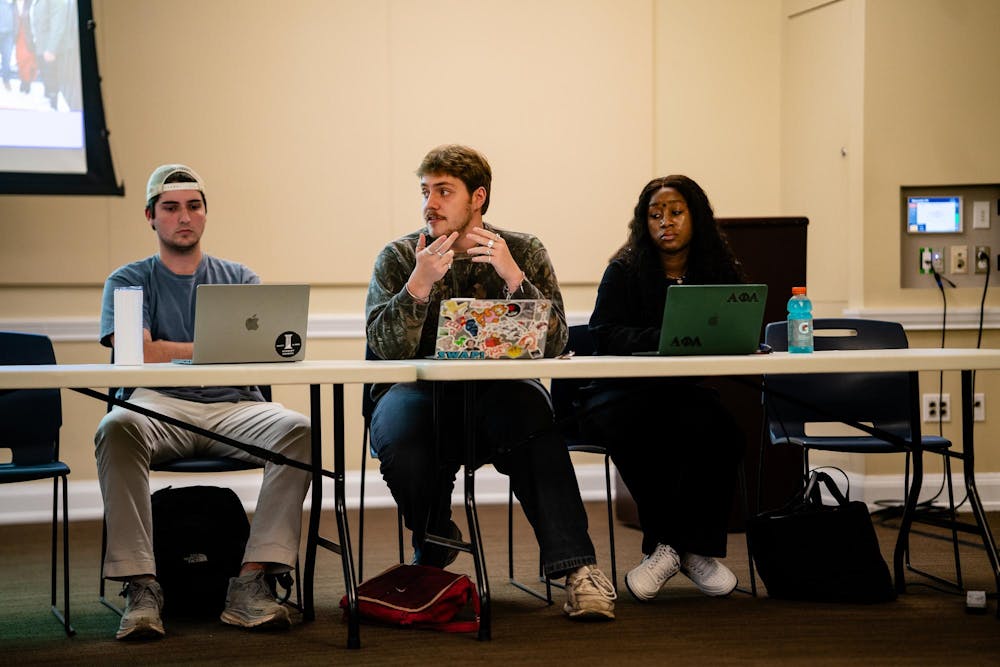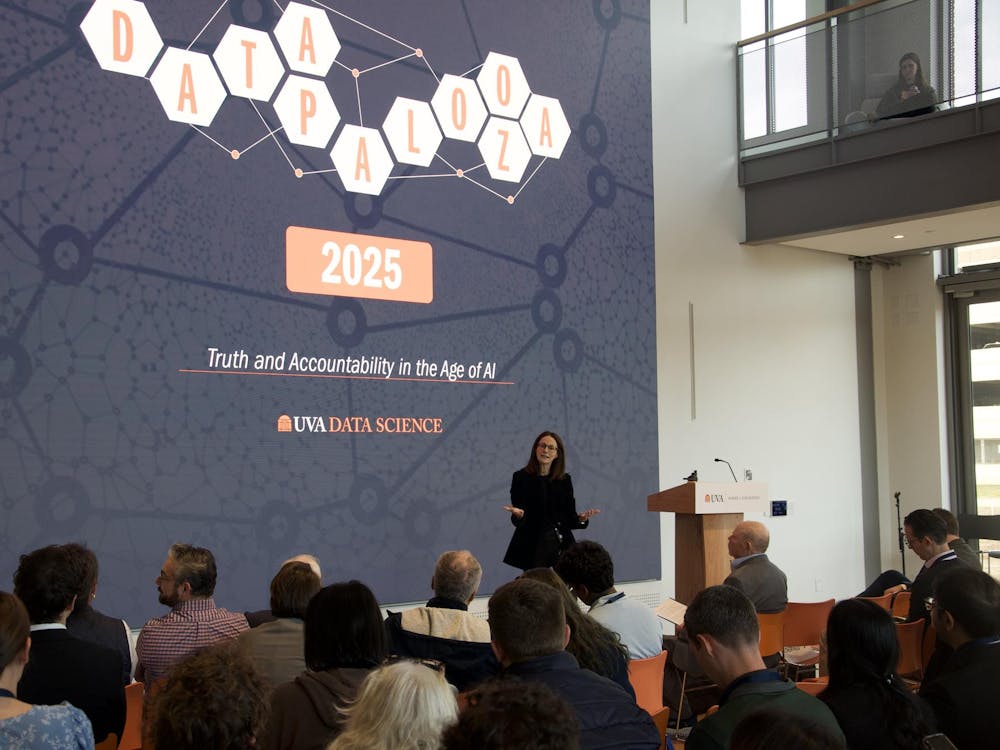Student Council approved a budget of $271,769.11 for the 2025-26 academic year during Tuesday’s general body meeting, which is approximately a $40,000 increase from the 2024-25 academic year. Student Council tabled two other resolutions to establish “Cavalier Health” — an initiative to expand health services Student Council can fund for students in need — and to request that the Board of Visitors increase the Student Activities Fee.
Prior to voting on the budget for the 2025-26 academic year, Student Council heard a presentation from Bertie Azqueta, Student Council chief financial officer and second-year Commerce student, regarding how the proposed budget came together. Azqueta said that the budget began as “nothing” and was formed by each committee specifically requesting the amount of money they wanted for the year.
“This budget was a lot of hard work between a lot of people, especially [executive members],” Azqueta said. “This was a team effort, and we really took our time [working] with each of the committee chairs and the agency heads to put it all together.”
While Azqueta presented on the proposed budget as CFO, Student Council’s broad internal operations are overseen by Princess Wuraola Olubuse-Omisore, Student Council vice president for administration and graduate public health student. Wuraola Olubuse-Omisore explained that funding for the Student Council’s budget comes from three sources. These include the $58 SAF fee per student from University student tuition, the Student Council’s personal fundraising money — which totaled to $7,928.50 this year — and the Student Council’s budget from University-allocated money.
In fall 2023, former University President Jim Ryan gifted $750,000 to the Student Council to be split over three years. In January, Ryan extended this gift with an additional $250,000 to be used for two more years. Clay Dickerson, Student Council president and fourth-year College student, noted that the $40,000 increase in this year’s budget is coming from the University-allocated money.
“The approval of [the University allocated budget] does not take away from student money,” Dickerson said. “We’re trying to use as much of the [University allocation] to fund what we do internally.”
Wuraola Olubuse-Omisore additionally explained that $20,000 of the $40,000 increase went towards the down payment to establish the Cavalier Career Closet, which the Student Council launched Aug. 26 to provide free business attire to University students. The other $20,000 of this increase in the budget is going towards funding four committees within the Student Council that have not received funding in previous years — these include the Appropriations Committee, Graduate Affairs, Board of Audit and Management and Alumni Relations.
Third-year College Rep. Jackson Sleadd supported the budget proposal and the work of the Administration Branch. He noted this is the first time he has seen the Student Council CFO attend the general body meeting to present the numbers.
“I really want to give commendation to Princess for this budget,” Sleadd said. “I’ve been a Rep. for two years before this, seen two budget processes before this … [I] really want to say thanks for the transparency.”
The budget proposal passed unanimously amongst Student Council representatives.
Student Council representatives heard an additional presentation from third-year Commerce student Minseo Kim and fourth-year College student Scott Dunn, the co-directors of the Appropriations Committee, regarding proposed updates to the SAF guidelines. The Appropriations Committee falls under the Organizations Branch of the Student Council and is responsible for allocating the SAF to Contracted and Independent Organizations.
According to the guidelines, all SAF funding requested by each CIO must show a demonstrated need for the funding and must be for some activity that benefits the University community. Also according to the SAF guidelines, CIOs majorly use SAF funding for traveling to events, hosting guest speakers and providing food at meetings. Dunn said that the proposed changes to these guidelines will decrease confusion among CIOs regarding how they can use their funding.
Dunn highlighted a few of the biggest clarifications to the guidelines, one being that each CIO receives $150 per semester for food and drinks, and any food or drink cost that goes beyond that budget will only be refunded if proven to be necessary for the event. Additionally, car travel will be funded at a rate of $0.10 per mile per person, which Dunn said is changed from the past guidelines that stated car travel would be funded $0.40 per mile per car of four.
"We believe that this will actually encourage more carpooling, because you get funded to have more people in one vehicle, whereas before, it was encouraged to take more than one car,” Dunn said.
These proposed changes to the SAF guidelines also passed unanimously.
Following the budget presentation from Azqueta and SAF guideline presentation from Dunn and Kim, Michael Mitchell, Student Council vice president for organizations and third-year Commerce student, presented the resolution he sponsored to propose an increase to the SAF by $4 for the 2026-27 academic year. SAF is a mandatory fee paid with tuition by every University student that the Student Council allocates to be used by CIOs.
For the 2025-26 academic year, the SAF costs each University student $58 — making the proposed cost $62 — and this money goes directly towards the Organizations Branch of the Student Council to then be allocated to CIOs. Mitchell said this increase would increase the total funding for CIOs by approximately $120,000 for next year, and that this would help meet every CIO’s individual needs in terms of funding.
“I would love to fund every CIO goal,” Mitchell said. “They are the backbone of the student experience [at the University].”
Mitchell also pointed out many other mandatory fees students pay each year that are much larger than the SAF — noting the athletics fee of $786 — and emphasized that this $4 increase is not large in the grand scheme of other fees.
“I ask that you consider this,” Mitchell said. “I think it will be tremendously impactful for the student organizations here.”
This proposal was tabled to be voted on by representatives at a future general body meeting, and if approved, will move to the Board for approval.
A resolution to establish Cavalier Health was also tabled during Tuesday’s meeting. According to Dickerson, Cavalier Health would fall under the Support and Access Services branch of Student Council, which works to provide low-cost services to University students, including textbook access and low-cost bus shuttling to international airports around University breaks.
Currently, the Student Council has an Accommodations Access Fund, that falls under the SAS branch in which students can apply to receive funding for equipment related to disability, therapy or psychiatric visits. Students may receive up to $2,000 per year through AAF. The Student Council’s other health-related initiative is providing free STI testing to students in partnership with the Student Health Wellness, but this initiative has been through the Cabinet branch of the Student Council.
Dickerson said the purpose of Cavalier Health is to move STI testing under SAS, expand SAS to include dental insurance for students who need it, and establish the Next Steps Fund, which — according to the resolution — will subsidize payment for a student’s first two sessions with a Charlottesville community therapist. The University requires all students to have medical insurance, but not dental insurance, and Dickerson said this is a medical service that can be expensive for a lot of students.
“We believe that a good first step would be supplementing dental insurance costs, and we’ve already worked this out between Student Health and Wellness,” Dickerson said. “[This] initiative would be housed under Cavalier Health and [there would be] a very smooth transition into it.”
Finally, two more resolutions were passed unanimously during Tuesday’s meeting. One was to approve the Latino Medical Student Association Pre-Health Latinx Undergraduate Society as an official CIO. According to Mitchell, this organization works to support Latinx pre-health students.
The final resolution approved directors to the agencies of the Student Council Cabinet branch, which is the branch that works to implement the long-term goals of the Student Council. This resolution was sponsored by Dickerson.
21 students sit on Student Council’s Cabinet — their names and roles can be found here.
Student Council will reconvene Tuesday at 6:30 p.m. for a regularly scheduled general body meeting.







